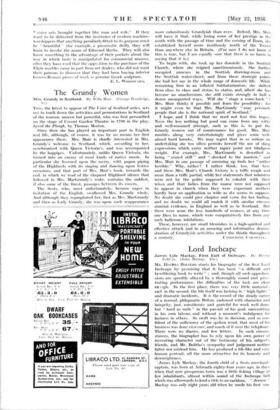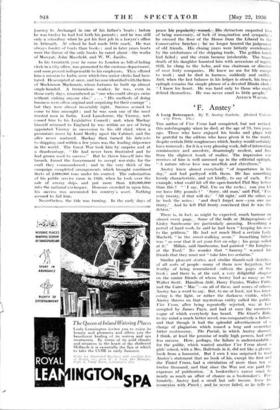Lord Inchcape
Mn. HECTO2 Boman) starts his biography of the first Lord Inchcape by premising that it has been " a difficult and bewildering book to write " ; and, though all such apprehen- sions are speedily allayed by a thoroughly sound and pene- trating performance, the difficulties of the task are clear tin igh. In the first place, there was very little material : and, in the second, the life itself was lacking in high lights and dramatic incidents. It is the record of the steady career of a normal, phlegmatic Briton, endowed with character and integrity, just, considerate and grateful for work well done, but " hard as nails " in the pursuit of his goal, unremitting in his own labour, and without a • moment's indulgence for laziness in others. So swift was he in decision, and so con- fident of the sufficiency of the spoken word, that most of his bUsiness was done viva twee, and much of it over the telephone. There were no diaries, and few letters. In 'such circum- stances, the biographer has to rely upon his own power of recreating character out of the testimony of his subject's Mends, and Mr. Bolitho's sympathy and judgement neither falter nor mislead him. He has produced a life-like and very 'Inman portrait, all the more attractive for its honesty and downrightness.
James Lyle Mackay, the fourth child of a Scots merchant- captain, was born at Arbroath eighty-four years ago, in days when that now prosperous town was a little fishing village of few ,inhabitants, alrimit Within sound' of the Incheape bell which was afterwards to lend a title to an earldom. " Jeemie Mackay was only eight years old when he made his first sea- journey to Archangel in one of his father's boats ; before; he was twelve he had lost both his parents ; and he was still: only a schoolboy when he got his first job in a lawyer's office: in Arbroath. At school he had made little mark. He was- always fonder of boats than books ; and in later years boats were the theme of the only books he cared about—the works.
of Marryat, John Masefield, and W. W. Jaco'bs. -
In his twentieth year he came to London as bill-of-lading clerk in neity office, was promoted to the customs department, and soon proved indispensable to his employers. They offered him a mission to India, over which two senior clerks had hesi- tated. Heaccepted at once, and became identified withthe firm of Mackinnon Mackenzie, whose fortunes he built up almost single-handed. A tremendous worker, he was, even in those early days, remembered as "one who could always swim without sinking anyone else." . . . " His methods of ,doing business were often original and surprising for their courage " ; but they were almost invariably right., Success seemed to come to hint unsought ; and he was soon one of the most trusted men in India. Lord Lansdowne, the Viceroy, wel- comed him to his Legislative Council ; and, when Mackay himself returned to England he was within an ace of being appointed Viceroy in succession to his old chief, when a premature Move by Lord Morley upset the Cabinet, and the offer never matured. Mackay then turned his interests to shipping, and within a few years was the leading shipowner in the world. The Great War took him by surprise and at a disadvantage. " He had never been frustrated and he had grown used to success." But he threw himself into the breach, -forced the Government to accept war-risks for the craft they commandeered ; and in the very thick of the campaign completed arrangements m- 'Melt brought combined fleets of 2,000,000 tons under his control. The culmination of his public service came in 1920, when he took over the sale of enemy ships, and put more than £20,000,000 into the national exchequer. Honours crowded in upon him, his success was accounted his country's asset. Nothing seemed to fail hith.- •
Nevertheless, the tide was turning. In the early days of
peace Iiiikpop(Oarity=wanedy*.detractors -suspected hi n of being mercenary, of lack of imagination and sympathy ; he crossed the floor of the House from the Liberal to the Consenntive benches ;- he no longer trusted the judgement of old friends. His _closing years were:bitterly overclouded by the misfortunes of the shipping trade. The golden touch had failed ; and the strain. became intolerable. The tragic death of his daughter haunted him with accessions of regret. Still, he clung to the helm, and was chairman or director of over forty companies. He knew no use for life except to work ; and he died in harness, suddenly and swiftly. And, when the last balance in his ledger is struck, his tru(... epitaph rzmains the simple phrase of a devoted Hindu clerk
I knew his heart. He was hard only to those who cow t defend themselves. He was never cruel to little people."
Annum Warcit.



















































 Previous page
Previous page